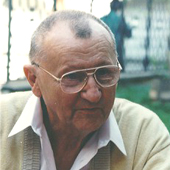
Zdenek Lukáš
d. 13 July 2007, Prague
Zdenek Lukáš (pronounced ZDEN-yek LOO-kahsh) ranks among the outstanding Czech composers of this century. He was born August 21, 1928 in Prague, Czechoslovakia. After graduating from the Theater Institute in Prague, Lukáš was an elementary teacher for five years. From 1953-1964, he was employed by the Czechoslovak Radio Studio in Plzen as an editor and literary manager where, in 1954, he founded and directed the mixed choir, Ceska Pisen (Czech Song), whose overall artistic standards he raised immeasurably during the course of its first 20 years. The choir achieved international acclaim under his direction, a tradition which it continues to this day.
Zdenek Lukáš’s music, as well as his personal fate, is a witness to the way in which natural gifted talent is confronted with a licentious society. Lukáš’s heirloom was the traditional musicianship of a teacher’s family He said, “We made music all the time at home.” He himself started as a teacher and none of his knowledge of composing was gained from the official establishment.
Lukáš began composing during high school while studying music theory under Antonin Madr. During the time he lived in Plzen, Lukáš focused on arranging folk songs for his choir, and gradually began to compose original works. Immersed in the ambience of folk music from his native region during his youth, Lukáš developed a unique compositional flavor having a sense of energy which characterises his work. Basically self-taught as a composer, Lukáš reflects the influence of folk intonations and impulses in his compositions. His musical development went through a number of stages the romantic beginnings of folksong arrangements, the writing of music for radio plays, then a period of testing experimental techniques in electronic music and finally a synthesis, a maturity reflecting a life full of musical spontaneity, yet with discipline.
Meeting the composer Miloslav Kabelac in 1962 provided an important impetus for Lukáš to develop and continue to establish his own reputation as a composer. For eight years, Lukáš worked with Kabelac to complete his musical training through tutorials. The support of this relationship of teaching and support was invaluable to him. Lukáš has devoted his life entirely to composition since 1964 with the exception of two interruptions, a temporary teaching position at the Prague Conservatory of Music and later a four-year directorship of a women’s chamber choir for the Czechoslovak State Ensemble of Songs and Dances.
After the tragic year of 1968, Lukáš turned to a sort of intuitive aloneness and directed his creative energy to developing a personal melodic and rhythmic style, the sources of which are comparable to the inspirational background of Carl Orff – the Czech language, Czech folklore and pre-classical music. Upon listening, one can always detect the inner spark of Lukáš after experiencing the first few moments of his music. His musical style comes across vividly and poignantly.
Lukáš’s personally expressive style of musical composition is a synthesis of traditional means of expression and contemporary techniques characterized by modal harmonic and melodic thinking, the simultaneous use of various tricky metric combinations on several planes and a feeling for tonal color. A rich melodic invention characterises his music. He seeks the center of mass for his compositions in melody. Typically, he employs a so-called octatonic scale with regular alternation of major and minor seconds so that the octave has one extra tone, eg. C-D-Eb-F-Gb-Ab-A-B-C. A rich feeling for the rhythm and meter based upon his intimate knowledge of folksongs and dances is evident in his craft. His mastery of form, which often contains rondo elements, reveals the composer’s extraordinary ability to reveal the latent potential for compositional stylizations.
Zdenek Lukáš is a prolific composer, numbering more than 330 compositions, which have won numerous international prizes and include 6 symphonies, many instrumental concertantes, several operas, chamber music and a vast treasury of choral and vocal compositions. Lukáš’s works are frequently performed at the various major festivals in the Czech Republic today and are attracting considerable attention abroad.
(Source: API Music)
